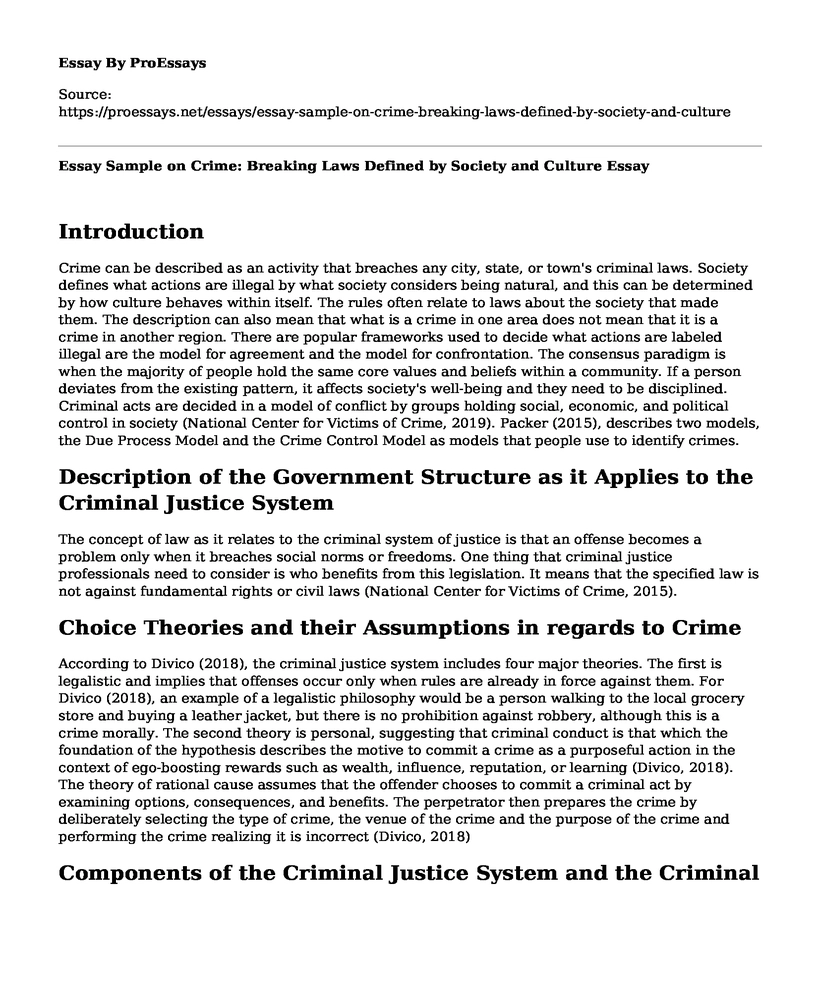Introduction
Crime can be described as an activity that breaches any city, state, or town's criminal laws. Society defines what actions are illegal by what society considers being natural, and this can be determined by how culture behaves within itself. The rules often relate to laws about the society that made them. The description can also mean that what is a crime in one area does not mean that it is a crime in another region. There are popular frameworks used to decide what actions are labeled illegal are the model for agreement and the model for confrontation. The consensus paradigm is when the majority of people hold the same core values and beliefs within a community. If a person deviates from the existing pattern, it affects society's well-being and they need to be disciplined. Criminal acts are decided in a model of conflict by groups holding social, economic, and political control in society (National Center for Victims of Crime, 2019). Packer (2015), describes two models, the Due Process Model and the Crime Control Model as models that people use to identify crimes.
Description of the Government Structure as it Applies to the Criminal Justice System
The concept of law as it relates to the criminal system of justice is that an offense becomes a problem only when it breaches social norms or freedoms. One thing that criminal justice professionals need to consider is who benefits from this legislation. It means that the specified law is not against fundamental rights or civil laws (National Center for Victims of Crime, 2015).
Choice Theories and their Assumptions in regards to Crime
According to Divico (2018), the criminal justice system includes four major theories. The first is legalistic and implies that offenses occur only when rules are already in force against them. For Divico (2018), an example of a legalistic philosophy would be a person walking to the local grocery store and buying a leather jacket, but there is no prohibition against robbery, although this is a crime morally. The second theory is personal, suggesting that criminal conduct is that which the foundation of the hypothesis describes the motive to commit a crime as a purposeful action in the context of ego-boosting rewards such as wealth, influence, reputation, or learning (Divico, 2018). The theory of rational cause assumes that the offender chooses to commit a criminal act by examining options, consequences, and benefits. The perpetrator then prepares the crime by deliberately selecting the type of crime, the venue of the crime and the purpose of the crime and performing the crime realizing it is incorrect (Divico, 2018)
Components of the Criminal Justice System and the Criminal Justice Process
The criminal justice system includes five main departments. Corrections / Police Department, the primary responsibility of the Police Department is responsible for maintaining laws, maintain order, offer protection, and serve poor people. Law Enforcement- the trials are for people accused of a crime being charged in front of their colleagues or a judge's jury. Courts are in place to find the facts and to offer redress to those who have gone against the laws set in place. Prosecution: Prosecutors are attorneys who defend the state or federal government throughout the court process from the first appearance in court of the accused until the prosecution or punishment if found guilty. Prosecutors have considerable flexibility or freedom to make decisions on how the crime can be handled. Victims can call the attorney's office to find out which lawyer is liable for their case. Defense Attorneys: defend the accused against the state in a case. They may be retained by the prosecution, or can also be recommended by courts to the accused persons who cannot afford an attorney. While the lawyer represents the state, the individual is served by the defense attorney (National Center for Victims of Crime, 2015).
Ethical Challenges in Criminal Justice
Within criminal justice, there are many legal problems when criminal justice practitioners are kept to some degree because of their job titles. Law enforcement officers are not prone to emotions of distrust, but they also receive care that is unique and or distinct from what someone is not in law enforcement. There are between 50 and 80 percent of people who check positive for drugs after detention, which has contributed to a very violent crime and drug usage disorder. A major ethical concern of law enforcement is a compromise of authority and power. As police officers carry out their duties within the society, they have the authority to make the best decisions and the authority to act on them (Campbellsville University, 2017).
References
Campbellsville University (2017). Removing the Blindfold: Ethics in Criminal Justice. Retrieved from https://online.campbellsville.edu/criminal-justice/ethics-in-criminal-justice/
Divico, T. (2018). What are the Four Choice Theories of Crime? Retrieved from https://legalbeagle.com/4673548-causes-criminal-behavior.html
National Center for Victims of Crime, (2015). The Criminal Justice System. Retrieved from https://victimsofcrime.org/help-for-crime-victims/get-help-bulletins-for-crime-victims/the-criminal-justice-system
Parker, H. (2019). Two Models of the Criminal Process. Retrieved from http://userwww.sfsu.edu/kwalsh/h_packer.htm
Cite this page
Essay Sample on Crime: Breaking Laws Defined by Society and Culture. (2023, Mar 27). Retrieved from https://proessays.net/essays/essay-sample-on-crime-breaking-laws-defined-by-society-and-culture
If you are the original author of this essay and no longer wish to have it published on the ProEssays website, please click below to request its removal:
- Accounting Fraud in Toshiba Company Paper Example
- Essay Sample on Social Media Crime
- Essay Sample on Inter-Country Conflict: US & Mexico Border Crisis
- Essay on Uncovering Invisible Alterations in Pen Inks With Document Examiners
- A Prosecutor's Vision for a Better Justice System - Essay Sample
- Essay Sample on Copyrights Should Not Be Equated With Fundamental Rights of Life and Liberty
- Report Sample on Five Traditional Types of Evidence







